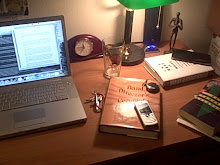March is a long a trying month for the music department at DHS - a school where seemingly everyone who tries makes the football team, but tryouts for the auditioned ensembles require two, sometimes three callbacks - no matter the program. Whether Choir, Orchestra or Band, it's pretty crazy if you think about it.
There's only one high school in a town of 63,000 - one standard Jazz "Stage Band," one 32 voice Madrigal Choir, only 4 clarinet spots in the DHS Symphony, and only 12 available in the Symphonic band (we have to fight for French Horns, however). The whole school's schedule is planned around making sure the kids who get into those programs can take their other classes, and therefore the administration needs to know who they'll be well in advance. The process is intense, even students in the ensembles have to re-audition and by their senior year, a lot of kids are used to disappointment and the effort required to maintain the standard of excellence.
However, this year I'm finding I have to deal with the students facing a level of disappointment for which they're not prepared: UC admissions, or rather lack thereof. I was lucky enough to work with this same band last year as a Paraeducator, and it seems like half of the Band's seniors went to UC Berkeley, and the other half to UCLA, with a few stragglers to Columbia, NYU or Puget Sound. This year, with cutbacks in admissions and hikes in fees, one person out of about 70 got into UCLA. Berkeley is sitting on their admissions still, but that outlook is grim. This fact was brought to light when their teacher excitedly mentioned that we were going to stop by the UCLA campus on our trip to San Diego in May and asked how many got in. One student tentatively raised his hand to nervous laughter from the rest of the group. I've even had kids come up to me bummed about not getting into UCD, their hometown "backup school."
These kids are bred overachievers, 5 or 6 AP classes on their plates, SAT scores above 2000 (they're out of 2400 now?). They're special, or at least have been told so all their lives by parents who all have Bachelor's degrees, many from UCs themselves. Now it's crashing down around them and the kids don't really know what to do, and I have no idea what to say to them.
To counteract the anxiety we're digging through new music to play on our trip. I'm learning that finding literature that's perfectly fit for a particular ensemble is one of the most important parts of being a music educator. However, the Symphonic Band my teacher has spoils him, and me by proxy. We're scheduled to play on the deck of the U.S.S. Midway in San Diego and my teacher is pulling out all the stops. Although it would be a little too blatant to dig out Midway March again (we played it last year on our trip to Victoria BC.), the director is grabbing all the "shiny" he can and dropping his own cash on scores to the Hal Leonard "John Williams Signature Series" - basically arrangements for professionals, not rearranged for younger bands. They're really just transcriptions of Williams' symphonic music to wind band parts, signed off by the composer, and the premiered by the U.S. Marine Band.
The music we choose is not just a festival set, but also enough to put on hour long "Pops concerts" around town while we're there and then come back and perform in the park in downtown Davis during the farmer's market to thank the community for their support.
The students have locked in Raider's March - the main title to Indiana Jones but the big problem we're facing is having to decide between the 1984 and 1996 Olympic Fanfares to kick off the set. This year we have an incredibly strong trumpet section. 10 kids - 7 of which are powerhouses and 3 are, well, third trumpets by definition. But selecting music like this requires a director to play towards the ensembles' strengths, and this year it's brass.
I don't know how he manages to pull it off time and time again, but their teacher has the ability to trick his students - baiting them with amazing music, and then saying something like "You know, I just don't know if you guys are up to this... " enlisting jeers and pleading from his kids to give it a shot, challenging them and forcing them to push themselves. This time though, I think he really means to cut "Summon the Heroes" the 1996 theme. Some worry or another about not being able to handle the articulation required of the piece. This kind of tears at me inside because it's absolutely gorgeous and our 1st chair trumpet player nailed the solo today. Music is supposed to evoke emotion and this piece does just that - not just fanfare, excitement and flourish, but something much more.
